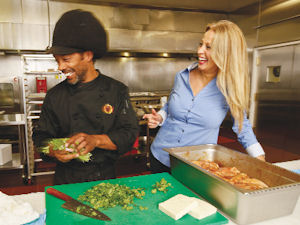It took a year and a half but Mariana Rossano was able to accomplish what many would deem unthinkable in a difficult economy: she raised $1 million from a dozen diverse and unlikely investors to launch her food delivery business Z.E.N. Foods. The pool of investors includes nutritionists and doctors (from pediatricians to plastic surgeons), a dog groomer, the owners of a Reseda gym, and a California State University, Northridge professor among others, whose investments ranged from $25,000 to $200,000. “They called me the investor stalker,” said Rossano of the funding feat, which required knocking on the proverbial doors of some 300 potential investors by her estimates. “I was showing up at offices unexpectedly, I wouldn’t leave anybody alone. But, I guess I just talk a lot and when I get in front of people my passion comes through and even in this tough economy people are willing to take a chance if you have a solid business plan and a great management team.” Z.E.N. Foods, which stands for Zero Effort Nutrition, targets high-end consumers looking to lose weight or maintain a healthy lifestyle by subscribing to meal plans that are home delivered and catered to their individual needs. The company opened this May in Sun Valley eager to capture market share in a growing niche segment of the overall weight loss market where companies such as NutriSystem, Jenny Direct (Jenny Craig), Medifast, eDiets Meal Delivery, Diet to Go, and many others have found enormous success. Track record Rossano has significant experience in the diet food home delivery industry having worked for two major companies including Burbank-based Freshology, which she helped found and run. It was that experience and successful track record, combined with the executive management team she assembled for Z.E.N. Foods, that helped calm some of investor’s initial fears, she said. “I got a lot of ‘no, I’m not interested”, said Rossano, who now laughs at how her persistence was able to turn those very adamant ‘No”s into $100,000 checks, and even got her own dog groomer interested in the business. “But getting the financing was incredibly hard for a couple of reasons,” said company CFO Jeff Arnold, who co-owns two Poquito Mas restaurants in Los Angeles. “Number one this is a start-up. Two, it’s the food service business. Three, even a person like me who’s been in the food service business for a long time was having a little bit of trouble getting my arms initially around how this works – this delivery to people’s homes – logistically, this is a very difficult business.” It took David Russell, a professor of finance and insurance at CSUN almost two months of serious consideration and studying the investor pitch, before deciding to jump onboard. Russell first came to learn of the business plan through friends he and Arnold had in common. “I believe it’s an undepleted niche, with experienced management. Their plan offers tweaks on some previously successful business models. It’s a high quality product and they’re starting with a low initial cost structure,” Russell said of his reasons for investing. “I was a little concerned initially about how the food might taste, but having subscribed to the program for a month I can tell you the food is fabulous and I have no doubts that the business will be successful,” he added. According to Arnold, investors really bought into their strategy and business model, which aims to get money back to investors within five years. “It’s a model that has a lot going for it,” he said. “It leverages efficiencies that we were able to acquire with the economy that will provide a competitive cost advantage.” Cost efficiencies Z.E.N Foods utilized the recent economic conditions to negotiate a fixed cost structure that is approximately 60 -70 percent of what would have been required prior to 2008, Arnold explained. “In an industry such as this, which has heavy fixed costs, these efficiencies will allow Z.E.N. Foods to provide an improved product and service at or below our competitors allowing us to take market share from [those] that cannot improve their cost structure in the short-term.” Some investors were lured by the untapped potential of the diet food home delivery market which in the U.S. is a billion dollar industry that appeals to the most affluent dieters, as well as convenience seeking time-pressed moms, executives, working couples, the elderly and others. For pediatrician Dr. Peter Waldstein, who’d been introduced to Rossano years ago, it was the premise that the business could do a lot to combat childhood obesity – one of his primary interests – what hooked him in. Z.E.N. Foods intends to aggressively market a child obesity program in the near future. “I’ve already been on the food myself. I’ve lost 8 pounds in three weeks. The food is nutritious, it’s tasty, if the kids and the families follow the program they will see weight loss. It will also teach families and children portion control and to eat healthy,” he said. And the high quality product is priced very affordably, he said. Price comparison The price of $49.95 buys you breakfast, lunch, dinner, a snack and dessert delivered to your house daily from Z.E.N. Foods. “Let me tell you this: my wife is a very good gourmet cook and she weighed the price of buying this food for a day versus shopping for three meals a day and it’s far less,” Waldstein said. Z.E.N. Foods is already delivering food to 50 clients in the greater San Fernando Valley and Los Angeles region, including to one A-list celebrity according to Rossano. The company expects to reach 300 clients by the end of the year. Z.E.N. Foods is also getting ready to launch a large marketing program that includes strategic partnerships with health food stores and yoga and fitness companies.
